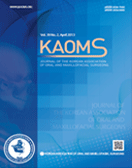Journal of the Korean Association of Oral and Maxillofacial Surgeons
- P-ISSN2234-7550
- E-ISSN2234-5930
- SCOPUS, KCI, ESCI
 ISSN : 2234-7550
ISSN : 2234-7550
Growth inhibition in head and neck cancer cell lines by gefitinib, an epidermal growth factor receptor tyrosine kinase inhibitor
김명진 (서울대학교)
Abstract
Cell survival is the result of a balance between programmed cell death and cellular proliferation. Cell membrane receptors and their associated signal transducing proteins control these processes. Of the numerous receptors and signaling proteins, epidermal growth factor receptor (EGFR) is one of the most important receptors involved in signaling pathways implicated in the proliferation and survival of cancer cells. EGFR is often highly expressed in human tumors including oral squamous cell carcinomas, and there is increasing evidence that high expression of EGFR is correlated with poor clinical outcome of common human cancers. Therefore, we examined the antiproliferative activity of gefitinib, epidermal growth factor receptor tyrosine kinase inhibitor (EGFR TKI), in head and neck cancer cell lines. SCC-9, KB cells were cultured and growth inhibition activity of gefitinib was measured with MTT assay. To study influence of gefitinib in cell cycle, we performed cell cycle analysis with flow cytometry. Western blot was done to elucidate the expression of EGFR in cell lines and phosphorylation of EGFR and downstream kinase protein, Erk and Akt. Significant growth inhibition was observed in SCC-9 cells in contrast with KB cells. Also, flow cytometric analysis showed G1 phase arrest only in SCC-9 cells. In Western blot analysis for investigation of EGFR expression and downstream molecule phosphorylation, gefitinib suppressed phosphorylation of EGFR and downstream protein kinase Erk, Akt in SCC-9. However, in EGFR positive KB cells, weak expression of active form of Erk and Akt and no inhibitory activity of phosphorylation in Erk and Akt was observed. The antiproliferative activity of gefitinib was not correlated with EGFR expression and some possibility of phosphorylation of Erk and Akt as a predictive factor of gefitinib response was emerged. Further investigations on more reliable predictive factor indicating gefitinib response are awaited to be useful gefitinib treatment in head and neck cancer patients.
- keywords
- Epidermal growth factor receptor, Head and neck cancer, Gefitinib, Epidermal growth factor receptor tyrosine kinase inhibitor
- 다운로드 수
- 조회수
- 0KCI 피인용수
- 0WOS 피인용수